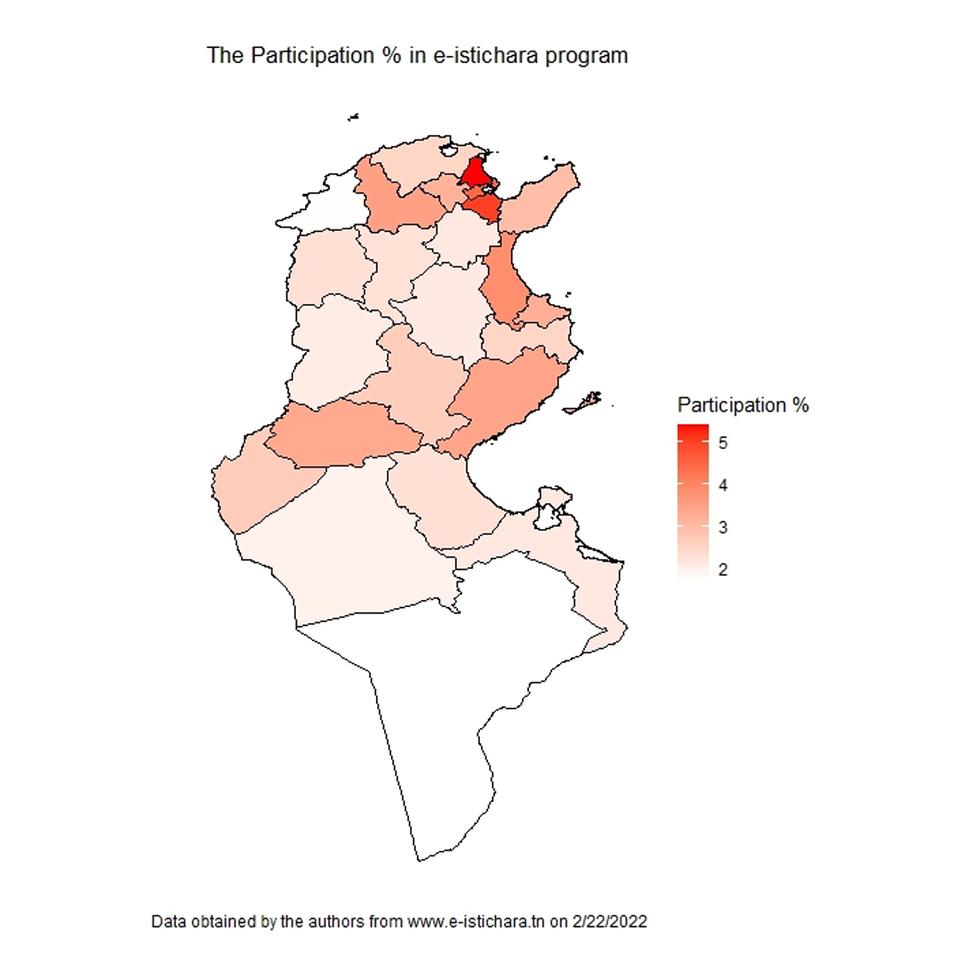Presented as a solution to the country’s challenges, the participatory platform appears to be a further step towards one-man rule.
More than six months after suspending the parliament, Tunisia’s president Kais Saied continues to consolidate his power. He recently closed the Supreme Judicial Council, a body constitutionally responsible for ensuring the independence of the judiciary and formed a new judicial body in its stead, leading to protests by the judges and thousands of Tunisians.
In the backdrop of these developments, an online constitutional consultation process, known as “e-istichara,” has been soliciting participation from Tunisians since January 15. The outcomes from the process are expected to set the content of the constitutional referendum on July 25 2022.
E-istichara is a free platform for citizens to “express their opinions” about the content of the proposed constitution. After logging into the website with their national IDs, Tunisians are asked to provide responses to multiple-choice questions in six broad categories: political and electoral affairs, economic and financial affairs, social affairs, development and digital transition, health and quality of life, and educational and cultural affairs. The respondents can also provide their written input at the end of the survey.
Launched with the tagline, “your opinion, our decision,” Saied considers this process to be a fulfilment of his promise for more “direct democracy.” Yet it is dubious that the consultation process will set the framework for an inclusive and durable constitution that produces democratic and tangible outcomes.
E-istichara can enable critical segments of society, including marginalised communities and the young and unemployed, to participate in the constitutional process. These groups tend to define democracy in terms of tangible economic outcomes like access to basic necessities, and whose aspirations the 2011 revolution has failed to live up to.
However, the mere introduction of an online consultative process does not necessarily guarantee more democratic – or tangible – outcomes.
For a popular online constitutional writing process to reflect the population's interests, it would require widespread participation and clear, unbiased questions. It would also have to transform preferences into a durable legal document.
Right from the start, there are issues with e-istichara. The government had a very short time to prepare the platform from Saied’s announcement on December 13 2021 until its launch on January 15.
Despite the government’s social media campaigns and the decrease of the age limit from 18 to 16 to incentivise participation, only roughly 2.5 percent of eligible citizens have participated in the process, with just over two weeks left until the deadline on March 20. This is a low percentage, even accounting for the fact that about 30 percent of Tunisians do not use the internet.

Wide inequalities in participation exist between the coastal regions that have been historically developed, and the interior regions, that have been marginalised. The participation rate is relatively high in the Greater Tunis area, such as Tunis, Ariana and Ben Arous, and low in governorates in the south and the interior, such as Tataouine, Jendouba and Kebili. Another form of inequality is gender, as roughly 74 percent of participants so far are male.
Some questions are also characterised by “nudging” effects that reflect the preferences of the president. For instance, eschewing any question on the responsibilities of the president, the survey asks: “In your opinion, what is the most important problem that you find regarding the judiciary?” This question prompts the participants to think that the judiciary, by default, suffers from multiple problems, which may necessitate intervention.
By the same logic, questions on the sources of economic hardships focus too extensively on regional dynamics at the expense of macro dynamics, such as trade deficits or monopolies. This can push participants to think that the roots of these problems lie in those specific echelons of power.
Finally, a truly democratic online consultation process has to transform citizens’ preferences into a durable constitution. Every constitution has a normative spirit informing the country’s overall legal framework. In the e-istichara process, only the first question is normative, asking respondents to choose three of seven pre-defined national priorities.
Another issue, perhaps even the biggest, is that the methods of analysing the responses remain unclear. Without a platform for debate and compromise, counting responses on pre-framed questions can lead to the preference reflection of the participating majority, as more developed regions and males are disproportionately represented. Such inequalities can influence the constitutional outcomes related to critical issues, such as development or women’s access to equality.
As James Madison famously argued, a legal document should define the checks and balances so that “ambition must be made to counteract ambition.” It is unclear how a constitution-writing process mostly devoid of popular participation and ambitions from different socio-economic groups – including those without access to the internet – can provide the necessary framework to achieve this.
Saied’s e-istichara project, coupled with his interventions in the judiciary, is a part of a larger trend. The president believes that the social, economic, and political stagnation in post-revolutionary Tunisia are due to the widespread corruption that has infected Tunisian institutions, particularly through the medium of political parties.
The solution, according to him, is to bring the revolution back to the people by “purifying” the institutions and shifting the political system towards a more direct democracy. A more likely outcome from his actions is the embodiment of a one-man rule that could succeed in creating the illusion of direct democracy, yet fail to deliver on its promises.













0 Comments